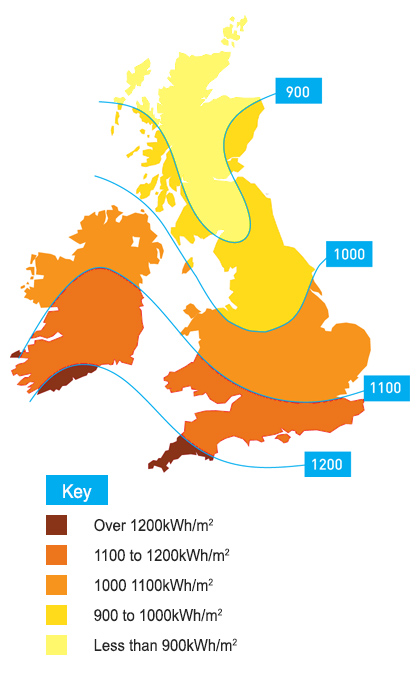5 Reasons Why Solar Works in Ireland
By Jane Schaefer and Morgan Pierce
Updated July 11, 2023
Our most frequently asked question is whether solar panels work effectively in Ireland. It’s easy to assume Ireland is too far north, and that warm Mediterranean countries are the only benefactors of solar energy systems.
Solar is really effective in Ireland. Here’s 5 reasons why now is the perfect time to install a domestic solar energy system:
#1 Plenty of ‘Solar Irradiance’
Solar irradiance is the energy output received in the form of electromagnetic radiation from the sun. Although it may not seem like it, Ireland receives just as much solar irradiance as do France and Germany Likewise, Ireland only receives 26% less solar irradiance than Spain, which is not a significant difference, considering Spain is much hotter and sunnier.
Ireland also has long summer days, ideal for solar energy generation. Ireland’s days are much longer than in Southern Europe, so what we lack in sun strength, we make up for in long daylight hours.
#2 Solar Panels Work Better in Cooler Climates
In fact, solar PV panels actually work less efficiently in extremely hot weather conditions, such as in Spain, as too much heat can reduce the efficiency of energy conversion within the panels. When a solar panel is already hot, electrons have more initial energy, so there are less electrons available to excite. When there are less electrons to excite, less energy is released, thereby reducing the total voltage generated. Ireland is therefore positioned nicely compared to other countries due to its relatively mild climate. Since the temperature rarely gets much warmer than 25 degrees celsius, conditions are truly ideal for solar to work in Ireland.

#3 SEAI Offers a Grant of up to €2,400
The SEAI has a grant for homeowner’s who install a solar panel system. An €1,800 grant is available for systems up to 2kWp. There is an additional €300 for every additional kWp, up to 4kWp of panels. That means the total Solar PV grant capped is at €2,400, even for domestic systems larger than 4kWp.
In order to be eligible for the grant, you need to have a BER energy performance rating of C or better after the installation of a solar system, and your home must have been built and occupied before 2011.
#4 Sell your Excess Electricity to the Grid
From 2028, the SEAI grant will begin to be phased out, because now homeowners will receive a rebate from their electricity supplier when they spill excess electricity to the grid as part of the Microgeneration Support Scheme.
This is a truly exciting time for solar in Ireland because we have a generous allowance from ESB Networks for the size of our domestic solar systems. The UK has a maximum of 16 Amps allowable which limits the size of the domestic solar system, so that very little can be spilled to the grid. In Ireland, we can connect 6 kWp of solar allowing us more opportunity to earn more from the excess electricity we can generate.
#5 Save up to €1200/year on Your Electricity Bill
With a domestic roof top solar system in Ireland, you can save €700-€1,200 every year off your electricity bill. As long as you have a suitable roof that is either south, west or east facing, solar will deliver a respectable return on your investment.
A 10-panel system will produce on average 3000 kWh of electricity every year. For every kilowatt of electricity you produce for yourself, you save on average €0.20. That’s already €600 euros in savings and that’s before we add the savings from a night tariff. Plus, you’ll get free hot water 8 months of the year when you divert excess electricity to your immersion, rather than spilling to the grid.
Solar really does work in Ireland – and investing in solar PV systems can bring many benefits, including reduced energy bills, increased energy independence, and a reduced carbon footprint. If you are interested in installing a solar PV system, it is worth exploring the different grant options available and seeking professional advice from one of our solar energy advisors.
Feel free to contact us for more information, we’re here to help.
